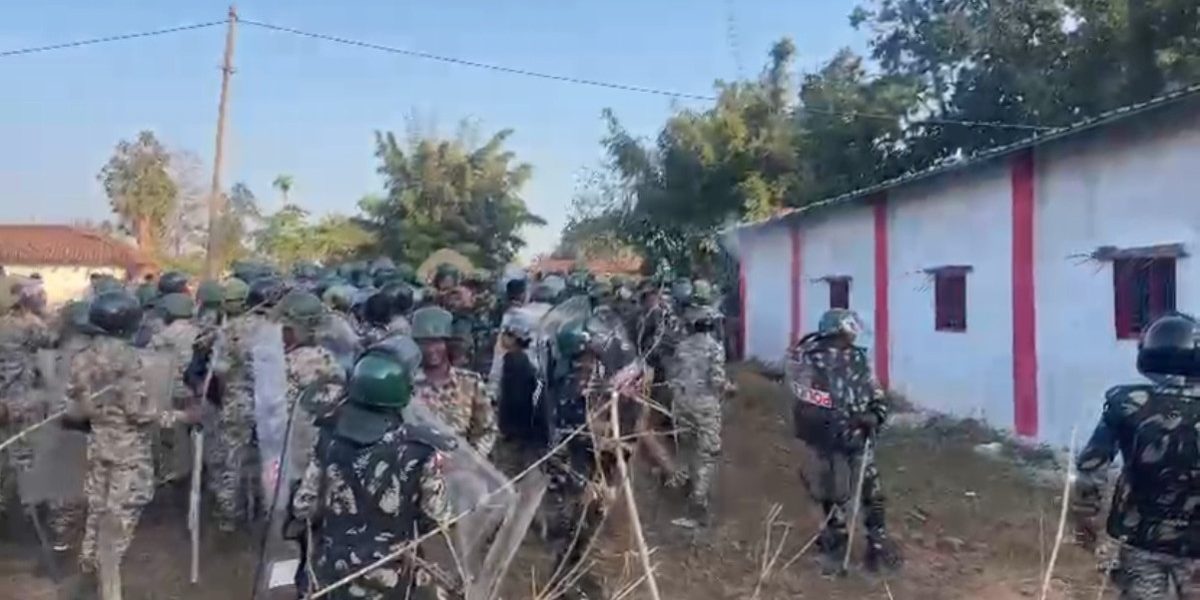A former Labour MP leading a review into last year’s unrest in the British city of Leicester has ties to a controversial think tank that downplayed the role of right-wing Hindutva activists in stoking community tensions.
Ian Austin, who now sits in the House of Lords as an independent peer, was appointed last week by communities secretary Michael Gove to conduct an independent review into last September’s violence in which Hindu and Muslim youths confronted each other on the streets of the city in the English Midlands.
But Muslim groups and activists in the city have raised concerns about Austin’s appointment over his connections to the Henry Jackson Society, which said in a report into the unrest last year that it had found no evidence of a role played by Hindu ultra-nationalist groups.
The report accused some members of the Muslim community of spreading a “false narrative” about the involvement of supporters of the Hindu nationalist movement.
Austin has hosted and spoken at a number of Henry Jackson Society events in parliament and has praised the neoconservative think tank’s “important and valuable work”.
But the think tank has been criticised by Muslim organisations including the Muslim Council of Britain, which accused it in 2017 of having “served to demonise British Muslim communities”.
Community activists in Leicester spoken to by Middle East Eye warned that Austin’s appointment would do more harm than good for community relations.
‘The government’s decision to appoint Ian Austin will create more problems than good – especially his close working relationship with HJS and their propagation of anti-Muslim tropes is deeply problematic’
– Sharmen Rahman, councillor
Groups who have condemned Austin include councillors from Leicester’s Hindu and Muslim communities, who sent a letter to British Prime Minister Rishi Sunak saying that his appointment “raises serious concerns about the review’s integrity and objectivity”.
“The choice of Lord Ian Austin as its chair, on the other hand, raises serious concerns about the review’s integrity and objectivity,” said the councillors’ letter to Sunak.
Leicester’s Federation of Muslim Organisations (FMO) also wrote to Sunak to condemn the appointment, warning that it would lead to a review that would have “no credence before it even concludes its findings”.
“While we welcome a fair and impartial inquiry to better understand the issues and to eradicate hate and division for all communities in our city and beyond,” the FMO said in a statement.
“We do not believe this can be achieved without the support or full confidence of our community. As it stands, we cannot, indeed, we will not support or contribute to an ‘inquiry without integrity’ from the outset.”
Sharmen Rahman, who served as a Labour councillor in the area where the unrest took place, said Austin’s appointment would create more problems than solutions for Leicester.
“One of our repeated requests was that the person leading the review was non-political and from a legal background so we could focus on facts and not push a political agenda so that it was fair to all parties – like a retired judge or a specialist in this field,” Rahman told Middle East Eye.
“The government’s decision to appoint Ian Austin will create more problems than good – especially his close working relationship with HJS and their propagation of anti-Muslim tropes is deeply problematic.”
“Both Austin and the Henry Jackson Society have a clear track record of demonising Muslims and perceiving Muslims as the problem, which means that the significant Muslim population which was affected by the violence will not trust his review and would not ascribe to the recommendations given by it.”
The Muslim Council of Britain also condemned the government’s decision to appoint Austin to lead the independent review into the Leicester riots.
“It is crucial to have an independent reviewer who is impartial, fair, and capable of gaining the trust of all stakeholders,” the MCB said in a statement.
Following last September’s riots in Leicester, local police arrested nearly 100 people in connection with the unrest.
Nearly 200 Hindu youths marched through Leicester’s Highfield area, leading to confrontations with the city’s Muslim community, chanting “Jai-Shri-Ram”, a chant appropriated by Hindu nationalists in India and frequently used to intimidate the country’s minority Muslim population…
This story was originally published in middleeasteye.net. Read the full story here





